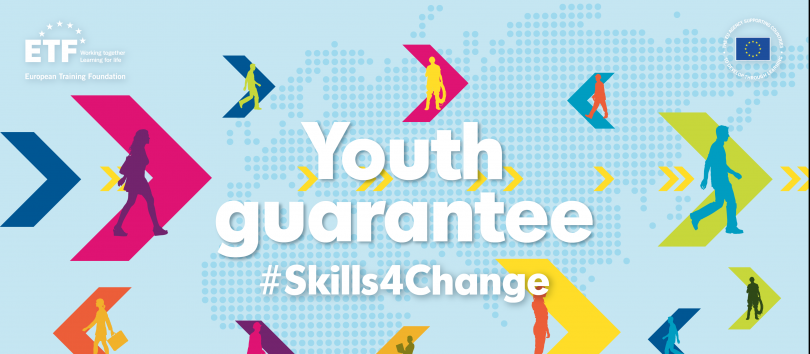
North Macedonia's Youth Guarantee: Knocking back the numbers of NEETs
Supporting young people in finding work or training has long been a priority in the European Union: since 2013, when the EU Youth Guarantee was launched, countries across the union have aimed to ensure young people receive a "good quality offer of employment, continued education, apprenticeship or a traineeship" within a period of four months of becoming unemployed or leaving education.
Between 2013-2019 the numbers of young people classified as neither in education, employment or training (NEETs) across the EU fell by 1.7 million. Just before the pandemic struck in February 2020, youth unemployment had dropped to a record low of 14.9%, official figures show. Though an "improved macroeconomic context certainly played a role, evidence suggest that the Youth Guarantee had a major transformative effect," the EU's Directorate General for Employment, Social Affairs and Inclusion states.
Over 24 million young people who were once registered in Youth Guarantee schemes are now in employment, education, an apprenticeship or a traineeship."
Tackling high numbers of young people not in education, employment or training (NEETs) is not only a concern within the EU: since 2018 North Macedonia has also offered its youngsters a Youth Guarantee.
The scheme, run by the Ministry of Labour and Social Policy, the Ministry of Education and Science, the Employment Service Agency and social partners including youth and social work outreach organisations, is a government 'structural reform priority'.
Introduced as a pilot project in 2018 in the capital, Skopje and the municipalities of Gostivar and Strumica, the scheme has been a proven success, which not even the pandemic has been able to knock off course over the past couple of years.
“The Republic of North Macedonia is the first country in the region that took a pioneering step in piloting the Youth Guarantee back in 2018.” said North Macedonia’s Minister of Labour and Social Policy Jagoda Shahpaska. “When it comes to young people and their labour market status, evidence shows notable gains in 2019. Though an improving macroeconomic context and demographic changes played a role, the Youth Guarantee also had a major effect.”
In its first year, the Youth Guarantee (YG) attracted 5,266 participants (2,694 of whom were women). Just under half (2,209 or 42%) successfully completed the Youth Guarantee with 1,972 finding jobs within 4 months (925 women) and 282 (187 women) being offered active labour market measures during the same period.
Numbers on the Youth Guarantee quadrupled over the next two years - with 25,502 (12,863 women) registered by 2020, of whom 7,684 found employment within 4 months and overall 35% (8,941) completed the scheme.
Figures for the first three months of 2021 - with nearly 6,000 registered - suggest the scheme will prove attractive this year too.
The role played by the Employment Service Agency has been crucial in the success of the scheme, organisers say. It registers young people, offers activation services and labor market integration measures for young people, and tracks the progress of participants through the Youth Guarantee.
Statement of Mr Abdush Demiri, Director of the Employment Service Agency of the Republic of North Macedonia
“One of the main focuses that we are working on is the integration of young people in the labour market” said Abdush Demiri, Director of the Employment Service Agency. “The Youth Guarantee Project is crucial in the fight against youth unemployment because through it we initiate rapid integration of young people in the labour market and prevent their long-term unemployment.”
An improving business environment, favourable economic conditions and employment reforms led to a constant decrease in the incidence of NEETs aged 15 to 29 from 32.5% in 2015 to 24.5% in 2019. However, in 2020, during the pandemic, NEETs increased to 26.9% - a trend witnessed in many other EU member states and Western Balkans countries. Although the economic crisis and its labour market impact are expected to gradually fade away, this shows again the vulnerability of young people to sudden economic shocks.
Since 2020, implementation of the Youth Guarantee has also been supported by an EU for Youth initiative, part of the EU's Pre-Accession Assistance to North Macedonia. The initiative includes, "support for effective communication approach promoting the opportunities for young women and men…public campaigns on VET [vocational education and training] and the Youth Guarantee…support for systematic application of tracer system methodologies for all VET providers and Youth Guarantee and employment generation programmes."
The success of North Macedonia's Youth Guarantee has drawn attention across the Balkans: in June 2021 in Tirana, Albania, it was mentioned during a panel discussion "Economic and Investment Plan for the Western Balkans: What's In It For Youth?" organised by Albania's Cooperation and Development Institute.
Kamil Valica, a team leader at the European Commission's DG Employment, Social Affairs and Inclusion, said that North Macedonia's Youth Guarantee programme showed what was possible in the region.
"From the example of North Macedonia, we can see [what] is possible. These topics need to be a real political priority, which means they must be high on the agendas of governments," Valica said, according to regional web portal European Western Balkans, which specializes in news about the European integration process.
Valica added that although EU funds were important to start the ball rolling on projects such as the YG, local funding and ownership were needed to give them sustainability.
The European Training Foundation is a partner of the European Commission and the International Labor Organization in providing support and advice to the Western Balkans countries in introducing Youth Guarantee schemes aimed at securing a good quality offer of employment, traineeship, apprenticeship, or continued education to all young people aged up to 30 and not in employment, education or training (NEETs).
Did you like this article? If you would like to be notified when new content like this is published, subscribe to receive our email alerts.